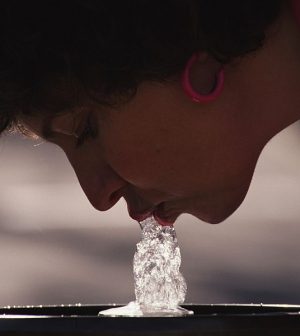- Could Your Grocery Store Meat Be Causing Recurring UTIs?
- Are You Making This Expensive Thermostat Error This Winter?
- Recognizing the Signs of Hypothyroidism
- 10 Strategies to Overcome Insomnia
- Could Artificial Sweeteners Be Aging the Brain Faster?
- Techniques for Soothing Your Nervous System
- Does the Water in Your House Smell Funny? Here’s Why
- Can a Daily Dose of Apple Cider Vinegar Actually Aid Weight Loss?
- 6 Health Beverages That Can Actually Spike Your Blood Sugar
- Treatment Options for Social Anxiety Disorder
How Much Water Do You Really Need?

You might have heard that drinking 8 glasses of water a day has health benefits that range from weight loss to brighter skin. You might also have heard that’s a myth. In fact, there are no national health guidelines on how much water you should be drinking.
According to the U.S. Centers for Disease Control and Prevention, if you’re healthy, you should get enough fluid by drinking when you’re thirsty and drinking fluids with meals. But you’ll need more if you’re outside in hot weather or sweating through vigorous activity.
Doctors know that drinking water and other fluids is important for kidney health. In fact, it may lower your risk for kidney disease. An Australian study found that people who drank the most water — about 13 cups a day — decreased their risk considerably.
Research done at Johns Hopkins University found that you can also reduce this kidney risk by losing belly fat and limiting your consumption of the mineral phosphorous. Though phosphorous is important for bone health, too much can be a problem, the researchers said.
Animal, dairy, and vegetable proteins naturally contain organic phosphorous, but levels are especially high in processed foods in which inorganic forms are often used as additives and preservatives.
People who took part in a healthy lifestyle program to lose weight had their urine tested for protein, an early sign of kidney disease. As they lost belly fat and ate less food containing phosphorous, the protein in their urine decreased.
Make sure you drink enough water for your body’s needs. Limit packaged foods in your diet and, when you do buy them, check for phosphorous by looking for the letters P-H-O-S on the label.
More information
For “water wise” tips on kidney health, visit the National Kidney Foundation.
Source: HealthDay
Copyright © 2026 HealthDay. All rights reserved.










